A recent survey in the retail sector revealed a fascinating trend: 80% of business executives are expecting to adopt artificial intelligence, or AI, technology in the next six years. The other 20% probably clicked the wrong button on their smartphone.
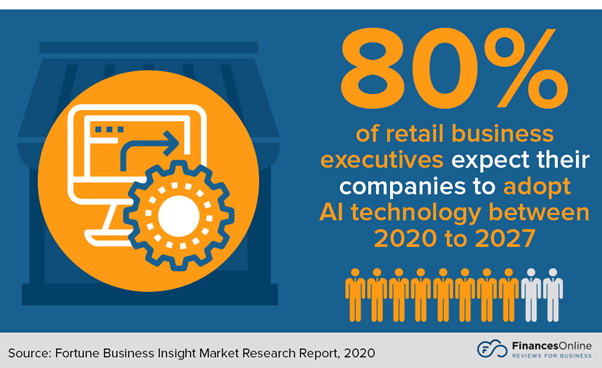
The AI revolution is affecting almost every area of life, and it’s given digital marketers near superhuman capabilities. In this article, we’ll take a closer look at these fantastic new abilities. We’ll see how startups and entrepreneurs can use AI to help develop a competitive advantage, and we’ll ask where next for digital marketing.
But perhaps most importantly, we’ll ask (and answer) the following: In a world where authenticity commands a premium, what role has artificial intelligence?
The benefits of AI in digital marketing
There are so many benefits of AI in digital marketing. We can compute vast quantities of data in milliseconds. We move at lightning speed. We can predict the future with terrifying accuracy. We can even duplicate ourselves and complete many tasks at once. Imagine what David Ogilvy would have achieved with that kind of power.
Here, I’m going to focus on four key areas:
- Greater insights
- Improved customer experiences
- More efficient processes
- Stronger SEO
1. Greater insights
Companies that use AI technology get an immediate boost to their research capabilities. It helps you gather more information with far less effort. In time sensitive situations, AI can give you the edge over your competitors.
Understanding customer behavior has long been a difficult subject for marketers. Customer segmentation has always involved a tradeoff. Do you provide a very specific offering to a relatively small group of people, or do you take a mass-market approach?

Companies that want to offer a targeted value proposition need a detailed knowledge of their customers. That takes time and costs money, but AI speeds up the process and reduces the price. It goes beyond that because it gives companies the ability to respond at lightning speed.
In effect, AI makes segmentation redundant. There are no segments, just people being treated as individuals. That’s a technique employed by many online retailers. Amazon’s suggested products feature is a great example. Customers can even provide feedback to help improve the suggestions.
The ability of AI to observe, learn, and adapt means that every interaction is an improvement on the last.
Just pause here and consider that for a moment.
If every single engagement with your company is an improvement on the previous one, where will you be in six months’ time? In a year’s time?
The first benefit is the depth of insight you can gain. By using AI, anyone can work with big data and find real insights that will boost your user engagement and improve your customer experience.
2. Improved customer experience
With the insights AI can provide, companies can develop their customer experience programs. AI helps you identify and predict customer requirements with more detail. You’ll get a much more nuanced view because it can quickly cover the entire experience journey.
It makes omnichannel strategies an achievable reality, even for startups with limited funds. The investment is one you will never regret. Using this technology, marketers can create a fully integrated customer experience.
Whichever platform a client reaches out on, you’ll know about it. Your AI will respond either by dealing with the request, often in the form of a chatbot, or by alerting you to the issue.
Chatbots have come a long way since their invention in 1994. We’ve seen speech recognition and replication improve dramatically. Contact center AI is an area where the technology is improving day by day.
It still has a way to go, but it’s getting there fast. Chatbots can deal with ever more complicated requests. That means greater convenience for your customers and leads. They can have their questions answered at any time and from any location. If the customer is about to make a purchase, a chatbot can help with real time sales support.
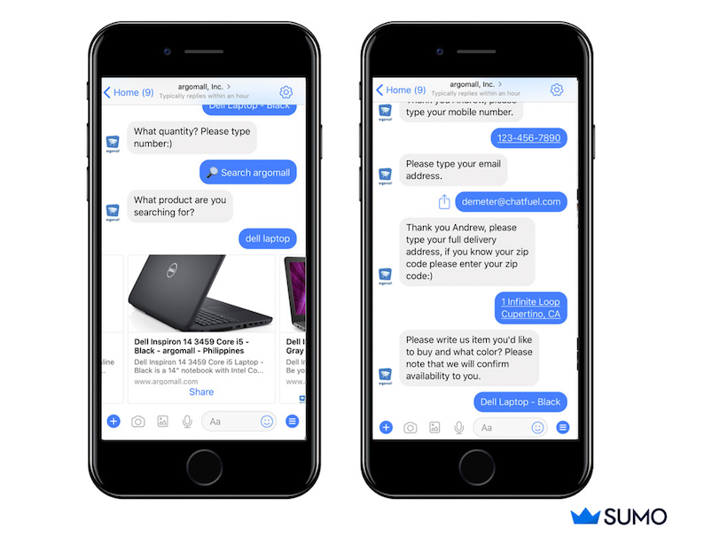
AI is great at detecting and recognizing stimuli from the outside world. A common example of this is the facial recognition feature on social media sites.
The applications for digital marketers center around personalization of content and the customer experience. There is a distinction between personalization and customization. Customization originates from the demand side. The client requests specific features of a product or service creating a unique offering.
Personalization, on the other hand, starts on the supply side. It’s when the firm knows what a specific customer wants, and creates a tailored offering to suit that individual. AI helps create personalized offerings, not customized ones.
A member of the public could walk into a store and as soon as they step through the door your facial recognition software kicks in. It identifies the individual and brings up all the information the organization holds about them.
You can see their purchasing history and all the previous engagements with that person. Say they always buy a particular item. Your AI can recognize that and notify a member of staff on the shop floor. Armed with that information you’ll be able to surprise and delight your clients time and again.
3. More efficient processes
A good digital marketing strategy needs to be efficient with resources. This is an area where AI can also bring a host of benefits.
Using AI you can map out all the processes that add value to the customer. From there, your AI will work out how to maximize the efficiency of each.
A good way to break this down is to use a model like Porter’s Value Chain.
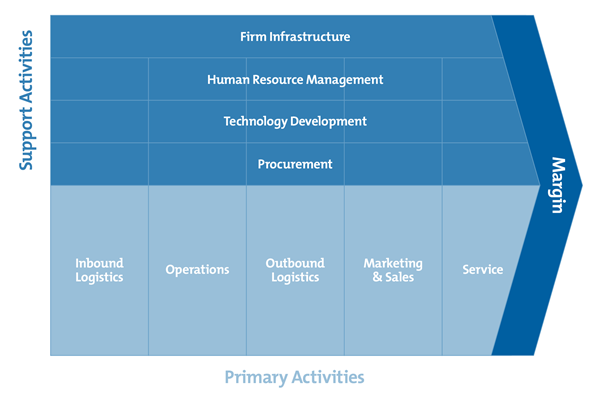
The value chain, first described by Michael Porter in the 1970s.
AI can find and create new efficiencies in almost any of your company’s digital marketing activities.
Consider a telephony company. AI can create efficiencies by showing ways to optimize the network to better serve the users. It can help with maintenance tasks, often spotting issues before they even arise.
Process automation is another great example. With AI, things like content management, scheduling posts, and multiple uploads become automatic. Setting up these automations leave you free to get on with running the business.
For companies that use customer service teams, AI can be a game changer. If a breakdown in customer service happens, they’ll know about it in real time wherever they are.
In the world of digital marketing, individual team members can be anywhere in the world. Many organizations are using a remote team these days, and AI helps to bring them together. It makes communications and file sharing easier and quicker.
Imagine one of your team is trying to solve a complicated problem using a mind map to help arrange ideas. Proper use of AI can help develop that mind map. It can take it from a descriptive activity into a detailed analysis. One that shows potential links that the human brain might not see.

4. Stronger SEO
SEO is one of the areas of digital marketing most impacted by AI. Search engines use machine learning algorithms to return the most relevant results for their users. AI can find and penalize web pages that attempt to game the system.
Keyword stuffing, poor backlinks, and low-quality content are all easily spotted by even the most basic of AI software.
The effect of AI on SEO strategy has been to improve and organize the web. The result is a better space for everyone. It means that digital marketers looking for SEO solutions can no longer take shortcuts.
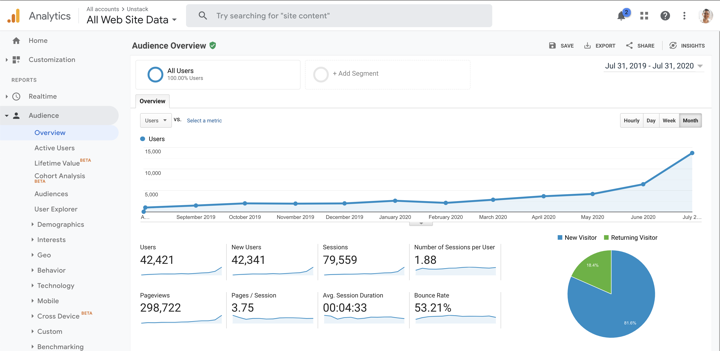
AI provides a wealth of tools for SEO. It can help you with on-page SEO by providing detailed analysis and comparisons of things like title tags and meta descriptions. It can help you improve readability scores by finding difficult sentences or excessive wordiness. Many content management systems use a form of AI to tell you just how well you’re doing, often with a traffic light system to help boost your SEO.
AI can tell you how quickly your site loads and what you can do to make improvements.
Balancing authenticity and AI in digital marketing
Artificial intelligence has so many benefits for businesses and consumers alike. It can improve almost all aspects of the customer experience. Companies can learn more and respond quicker than ever before.
But is AI a magic bullet? Is it the answer to business at the speed of thought? Nobody wants to see their local store staffed with expressionless robots. When you reach out to an organization, it’s good to know you’re talking to a real person rather than a clever algorithm.
The fact is that AI is artificial. Organizations that try to fool their consumers into believing their chatbots are real people are only kidding themselves. AI has a strong role to play in marketing, especially digital marketing. But companies need to decide which tasks are best performed by living people, and which are best left to AI systems.
Academics have been looking into this question and they described three types of business activity. There are thinking tasks like processing and analyzing data. There are mechanical tasks like repairing and maintaining equipment, and there are feeling tasks like communications.
AI is great at the thinking tasks because of its inherent speed and computing power. It’s increasingly able to cope with mechanical tasks, too. Think of driverless cars, robotics, or the mechanics of web development.
It’s the feeling tasks that AI has yet to master, and perhaps it never will.
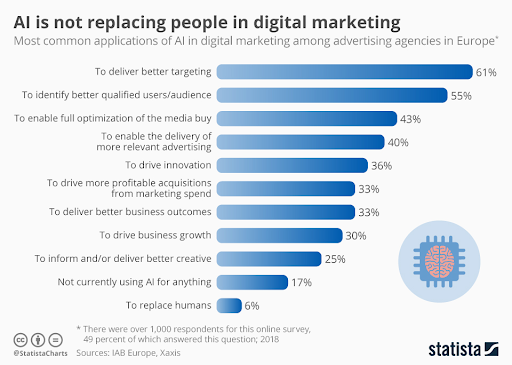
Human emotions are often irrational. They are frequently illogical. They seem diametrically opposed to the formal reasoning of artificial intelligence. In the foreseeable future, feeling tasks are best left to your paid staff. Allow your organization to keep its human face, but have it supported by the latest technology.
Regulating AI in digital marketing
AI has existed in one form or another for around 70 years, but in marketing it’s still in its infancy. It’s already revolutionizing the sector, and it has the potential to go much further. AI has become part of our everyday lives, and yet it is not well understood and remains far from perfect.
Digital marketers are forging ahead, but the path has many pitfalls. Did you know that the software used in facial recognition is more accurate at recognizing lighter skin tones? It’s a dangerous state of affairs that perpetuates a racial bias.
Digital marketers need a good awareness of AI, and its limitations. We should be using AI in conjunction with human intelligence to avoid unintentional consequences. The companies that benefit the most from AI are the ones that allow it to play a supporting role, not a leading one.
AI is a complicated technology. It seems unlikely that digital marketers will ever truly understand what’s going on under the hood of AI systems, and that presents problems. The technology is opaque, and that implies a level of risk. Companies need to assess that risk and discover ways to mitigate bad consequences.
Looking ahead to AI in digital marketing
The advances that AI has brought to the field of digital marketing are phenomenal. It may seem like the future has already arrived. The capabilities that it affords digital marketers today would astonish those of previous years and that trend is set to continue.
Digital marketers can enjoy far greater insights into complicated areas like customer behavior. We can automate thinking tasks and mechanical processes. That leaves human beings to focus on the emotional feeling tasks.
The take home, then? AI should play a supporting role in your organization. AI will help you scale your business and automate tasks. But it can't undertake feeling tasks with anything like the success of a living breathing human being.
About the author
Marjorie Hajim is the SEO Manager for EMEA at RingCentral, a leading cloud communications company that provides VoIP, video conferencing, and screen sharing services. She develops and executes strategies for short-term and long-term SEO growth. In her spare time, she loves reading books at coffee shops and playing with her dogs.
